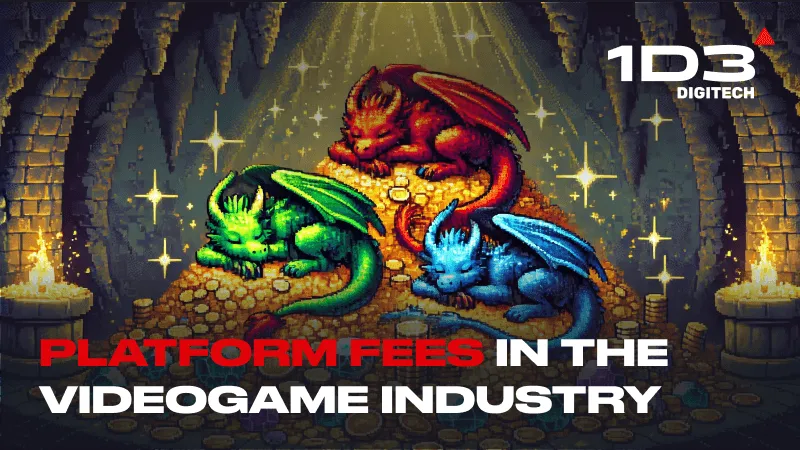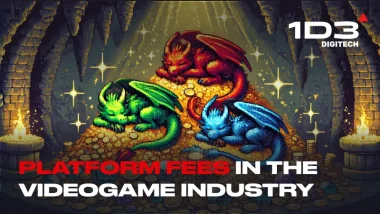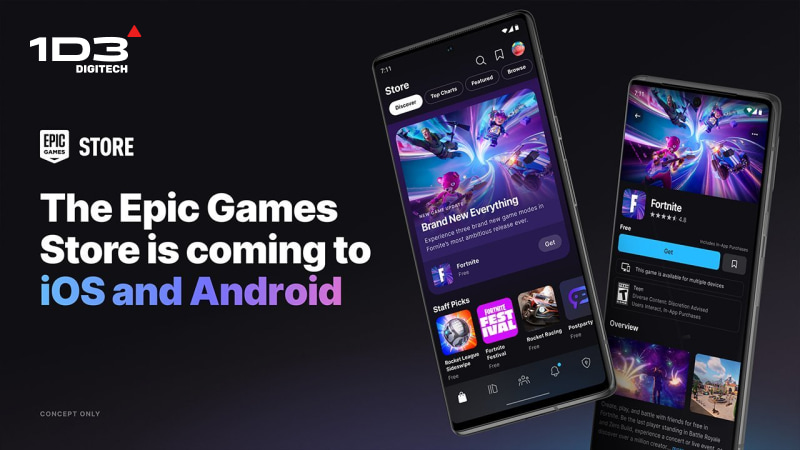Platform fees are a fundamental part of the videogame industry. They significantly affect game developers and gamers and how games are distributed on various platforms. But what are each platform's fees, and is there a way to distribute games without platform fees? Let's find out.
What Are Platform Fees in the Videogame Industry?
Platform fees are charges that game developers must pay to platforms that host their games. Whenever a developer wants to publish their game on platforms like Steam, PlayStation Store, or the App Store, they have to pay a certain percentage of each sale as a fee. These fees, often ranging from 15% to 30%, represent a significant chunk of the revenue generated from game sales.
DISTRIBUTE WITHOUT PLATFORM FEES!
GET IN TOUCH WITH 1D3These fees apply to various platforms, including PC stores like Steam and Epic Games Store, consoles like PlayStation and Xbox, and mobile platforms like Apple's App Store and Google Play. In essence, platform fees are the cost developers incur for accessing the infrastructure, market reach, and services these distribution channels provide.
Why Do They Charge Platform Fees in the Videogame Industry?
Platforms charge these fees to cover the costs associated with maintaining their services. They provide infrastructure, hosting, payment processing, marketing, and customer support. They can ensure a smooth experience for both developers and consumers by charging fees.
For developers, these platforms offer access to massive audiences that would be difficult to reach independently. The fees also help fund various promotional opportunities like featured placements or discounts, which can boost visibility and sales. For the platforms, these charges help ensure their operations' sustainability while generating profits.
Platform Fees of Major Gaming Platforms
PC Platforms
Steam
Steam charges a base rate of 30% on in-app purchases and game sales, along with a $100 fee to join the Steam Partner program. However, there are conditional rate reductions: after reaching $10 million in sales, Steam's cut drops to 25%, and after $50 million, it further decreases to 20%. The 30% fee also includes services like payment processing, VAT calculation, and remittance, as well as access to a range of tools, including the Steamworks SDK, cloud storage, and analytics.
Epic Games Store (EGS)
Epic Games Store charges a lower fee of 12% on video game sales and in-game purchases, making it attractive to developers. This commission covers payment processing and sales tax management, and EGS also offers the First Run Program, allowing developers to receive 100% of revenue for the first six months after launch.
Additionally, developers can use third-party payment services for in-game transactions, potentially raising their revenue share to 75%, which makes EGS a flexible and developer-friendly option. Epic Games Store lacks Steam's extensive audience and community features, making it harder for games to gain visibility and foster player engagement.
GOG
GOG (Good Old Games), owned by CD Projekt, charges a 30% platform fee, similar to Steam. This fee covers payment processing, VAT collection, and remittance, meaning developers typically receive about 50% of game sales revenue after accounting for VAT/Sales Tax and GOG's commission.
All GOG games are DRM-free, promoting consumer rights and fostering trust among developers, gamers, and distribution platforms. GOG also offers features like the Steam SDK Wrapper for easy porting from Steam and GOG Galaxy, an optional client that integrates games and friends with community features comparable to Steam.
Microsoft Store
The Microsoft Store charges a 12% platform fee for PC game sales, significantly lower than the standard 30% other major platforms charge. This reduction, effective on August 1, 2021, aims to make the Microsoft Store more competitive with platforms like the Epic Games Store. The fee covers payment processing, VAT collection, and remittance.
Additionally, the Microsoft Store provides integration with Xbox services, making it a viable option for developers looking to reach both PC and Xbox audiences. However, it lacks the extensive community features of platforms like Steam, which can affect game visibility and engagement.
Mobile Platforms
AppStore
The Apple App Store charges a 30% commission on app sales and in-app purchases, which reduces to 15% for developers earning less than $1 million annually.
In the European Union, developers can use alternative payment service providers (PSPs) or direct users to external websites for transactions. However, Apple still imposes a commission on these transactions: 10% for App Store Small Business Program developers for subscriptions after the first year and 17% for others. Additionally, developers using external PSPs must pay a core technology fee, which covers the costs of maintaining the App Store platform, security features, and other core services that enable app distribution and functionality.
Apple manages VAT collection and remittance for developers, streamlining the tax process. The App Store also provides extensive community features, including curated listings and user reviews, to enhance app visibility.
Google Play
Google Play Store maintains a standard service fee structure. Developers are charged a 30% fee on app sales and in-app purchases. However, for developers earning less than $1 million annually, this fee is reduced to 15% for the first $1 million each year, a policy introduced to support smaller developers.
Google Play's approach to Value-Added Tax (VAT) or similar sales taxes varies by country. In many regions, Google is responsible for determining, charging, and remitting these taxes on behalf of developers, simplifying the tax process. However, in certain countries, developers may manage these taxes themselves. Developers must review Google's tax policies and consult local tax regulations to ensure compliance.
Alternative payment service providers (PSPs) are primarily available within the European Union. For customers outside the EU, Google Play generally requires the use of its own billing system for in-app purchases. Developers should stay informed about any policy changes that may expand alternative billing options to other regions in the future.
Alternative Mobile App Stores
Amazon Appstore: Developers receive 70% of the list price for app sales and in-app purchases. However, the Amazon Appstore Small Business Accelerator Program offers an 80/20 revenue share for developers earning less than $1 million annually, along with AWS credits equivalent to 10% of app revenue on Amazon devices.
Huawei AppGallery: Currently, Huawei takes a 30% commission on revenue generated through its AppGallery. Although the earlier promotional offer in 2020 provided up to 100% of revenue to developers for the first two years, Huawei's ongoing initiatives still aim to make AppGallery a competitive platform for developers.
Samsung Galaxy Store: Samsung does not charge developers a registration fee. The platform applies a 30% commission on app sales and in-app purchases, aligning with industry standards.
One Store: This South Korean app marketplace offers a more developer-friendly revenue share. It takes a 20% commission on app sales and in-app purchases, allowing developers to retain 80% of their revenue.
Consoles
Sony PlayStation
Sony's PlayStation Store charges a 30% platform fee on digital sales, similar to other major platforms. This fee covers various services, including payment processing, VAT/Sales Tax management, and hosting infrastructure. PlayStation also provides various developer tools, such as the PlayStation SDK, which helps in game development, updates, and integration with platform-specific features.
Additionally, Sony offers community features like curated listings, user reviews, and promotional opportunities, all of which help enhance game visibility. Despite the significant platform fee, these services make the PlayStation Store an essential platform for reaching console gamers.
Xbox
Microsoft's Xbox Store charges a 30% commission on digital game sales and in-app purchases, aligning with industry standards. This fee supports development hosting, payment processing, Xbox Live services integration, achievements, and online multiplayer capabilities.
Nintendo
Nintendo charges developers a 30% fee for hosting their games on the Nintendo eShop. This fee supports maintaining Nintendo's infrastructure and curating its game library, which includes first-party and third-party titles. To assist developers, Nintendo offers a range of tools and resources through the Nintendo Developer Portal, including access to development kits, software development tools, and comprehensive documentation. Additionally, Nintendo provides marketing support, such as featuring games in the eShop and promoting them through various channels, to enhance game visibility.
Is There a Way to Avoid Platform Fees in the Videogame Industry?
One of the most effective ways to avoid platform fees is through direct-to-consumer distribution, which involves selling games or in-game items directly from the developer's website. While this method requires more effort from the developer's side — including marketing, sales tax/VAT management, payment processing, and community building — it can be more profitable, as it eliminates the 30% cut taken by platforms. Some games like Escape from Tarkov and massive MMOs like World of Warcraft have already successfully used this model.
START YOUR D2C JOURNEY NOW!
GET IN TOUCH WITH 1D3To make this approach more manageable, developers can use a merchant of record like 1D3 DIGITECH, which handles payments, sales tax, fraud protection, and support globally. This makes it easier to maintain a direct-to-consumer model without taking on all the administrative burdens, allowing developers to focus on creating great games while paying 3% for the MoR service instead of giving away 30% to platforms.





